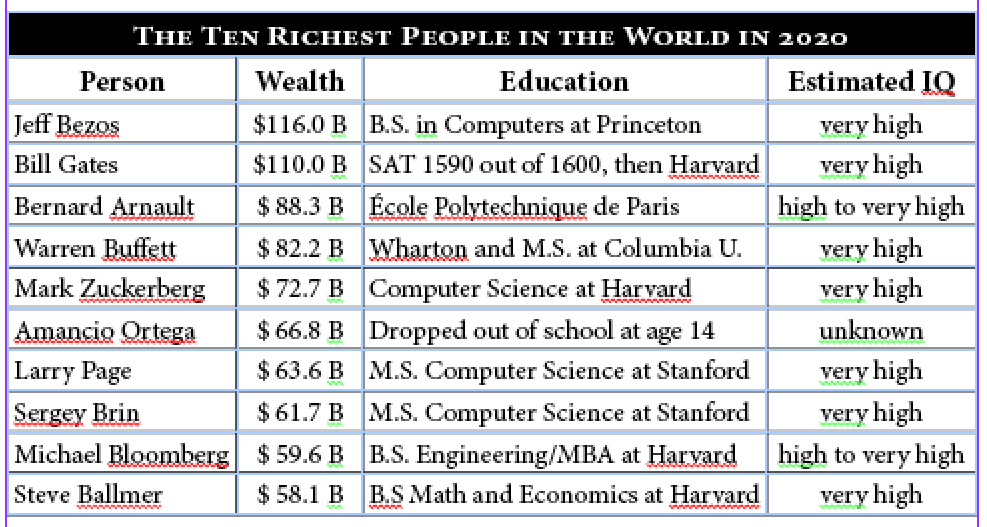On February 28, 2020, CEOWORLD Magazine ranked the world’s top 50 billionaires from “richest to poorest”. As we might expect, these megawealthy individuals belong to the high-IQ group. The table below (taken from my book on intelligence) displays the net worth and the educational backgrounds of the top 10 in the rich list–most of them having specialized in mathematics and computer science. Their IQs are estimated from their scholastic records, SAT scores, and the calibre of the universities at which they were accepted. Where SAT scores are unknown, the institution at which an applicant is accepted is a reasonably good indicator of his SAT score and, in turn, his IQ.

For example, Bill Gates, with a reported IQ of 160 had a near perfect score of 1590 out of 1600 on his SATs and was accepted into Harvard where he studied law, mathematics, and computer science. Jeff Bezos, identified as “gifted” in elementary school, was accepted at Princeton and subsequently graduated summa cum laude in electrical engineering and computer science. Warren Buffet attended the Wharton School of Economics, where he studied for 2 years before transferring to the University of Nebraska from which he graduated at age 19. He subsequently earned a Master of Science degree in Economics at Columbia University. Bernard Arnault studied at the prestigious École Polytechnique de Paris where he received a BA in engineering. In 1985, he bought Christian Dior using $15 million from his father’s construction company and went on to build the luxury goods group LVMH that includes Louis Vuitton and Sephora.
Amancio Ortega is the outlier in this stellar cast. His IQ is unknown because he dropped out of school at age 14 and worked his way to the top of the clothing industry, starting at the bottom as an assistant to a local shirtmaker. However, his chain of successes in the business world suggest that he has a high level of intelligence.
Mark Zuckerberg, like Bezos was identified as gifted early in his career and won prizes in mathematics, physics, and astronomy while attending the prestigious Phillips Exeter Academy in New Hampshire. While a student at Harvard University, he developed the Facebook software that would become his signature creation and make him a billionaire at age 23.
Larry Page’s father was a computer science professor at Michigan State University where his mother taught computer programming. Following a stellar academic career that brought him to Stanford, Larry predictably pursued a Ph.D. in computer science. His thesis supervisor Terry Winograd suggested that he investigate how the articles on the World Wide Web were linked. Pursuing this suggestion, Page embarked on a project he called “BackRub” that would trace each page on the web back to its antecedents. This would eventually enable the identification of the seminal sources from which the other links emerged. Excited by the challenge of the BackRub project, fellow Ph.D. student Sergey Brin joined the project and the two massaged BackRub into what we know today as Google–a system for organizing the world’s information base that has been described as “the most empowering invention since Gutenberg’s printing press.”
Like Warren Buffett, Michael Bloomberg was interested in the world of finance. He completed a Bachelor of Science in engineering at Johns Hopkins University and an MBA at Harvard Business School. This led to his founding of a business that provided Wall Street with highly sophisticated analyses of trends affecting various types of investments.
Steve Ballmer, a Harvard classmate of Gates who studied applied mathematics and economics, had scored a perfect 800 on the math section of the SAT. Their emotionally-charged debates in the Harvard dorm during the small hours of the morning–exchanges that Gates called, “high bandwidth communication”–are legendary. In 1980, Ballmer left the MBA program at Stanford to join Microsoft Inc. as its first business manager, and became its CEO in 2000.
This brief survey of the ten wealthiest people in the world reaffirms the old adage, “there is no substitute for brains.” All of these men, (except possibly Arnault who received money from his father’s business) were self-made billionaires with high or very high IQ. Brilliant inventions and technological breakthroughs that generate megawealth seldom, if ever, come from those of low or mediocre IQ. A close review of the next 490 top-ranked billionaires in the rich list reveals that those who have accumulated (rather than inherited) great wealth are overwhelmingly drawn from the ranks of those with so-called “book smarts,” even though the applications of their intelligence may appear to be very practical and removed from an academic context.
While a high IQ is a valuable asset for those seeking great wealth, there are many Hi-Q people who never accumulate much wealth because they are not interested in acquiring money or because their passion is channeled into some academic or artistic pursuit. One example is Chris Langan, billed as “the smartest man in America,” with a measured IQ of 190. His story, along with those of other Hi-Q people who never aspired to wealth is told in Malcolm Gladwell’s book Outliers. In his book, Entrepreneurial Genius: The Power of Passion, Gene Landrum presents anecdotal information to support his assertion that passion, tenacity, and self-efficacy are as important as IQ in entrepreneurial success.
